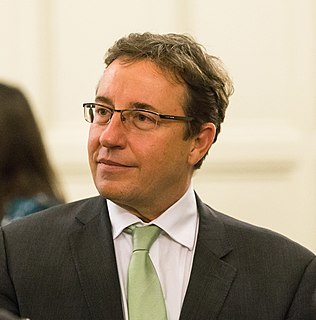A Quote by Achim Steiner
A recent report by UNEP and Interpol estimated that between 50 to 90 per cent of logging in key tropical countries of the Amazon basin, Central Africa and South East Asia is being carried out by organized crime. This threatens not only attempts to eradicate poverty and deforestation but also efforts to combat climate change.
Related Quotes
...the world needs to face up to the challenge of climate change, and to do so now. It is clear that climate change poses an urgent challenge, not only a challenge that threatens the environment but also international peace and security, prosperity and development. And as the Stern report showed, the economic effects of climate change on this scale cannot be ignored, but the costs can be limited if we act early
Here's the truth. The proposed top rate of income tax is not 50 per cent. It is 50 per cent plus 1.5 per cent national insurance paid by employees plus 13.3 per cent paid by employers. That's not 50 per cent. Two years from now, Britain will have the highest tax rate on earned income of any developed country.
In my view, nobody is really effective in tackling those organized crime networks that are making connections from Africa to Asia to fund and facilitate the poaching of massive volumes of ivory, and then selling it on the Asian market. Very few people have tried globally to tackle that serious organized crime threat that is also linked to militia groups. That needs to change. You need to bring the full weight of government attention to dealing with that.
If college cut-offs are above 90 per cent in a particular class, then where would mediocre students with 60 per cent or 70 per cent go? Students who secure 60-70 per cent marks are also intelligent, but they could not get admission in courses of their choice for scoring lower marks than the toppers.
By 2050, at bio-extinction's current rate, between 25 per cent and 50 per cent of all species will have disappeared or be too few in numbers to survive. There'll be a few over-visited parks, the coral reefs will be beaten up, grasslands overgrazed. Vast areas of the tropics that have lost their forests will have the same damn weeds, bushes and scrawny eucalyptus trees so that you don't know if you're in Africa or the Americas.


































